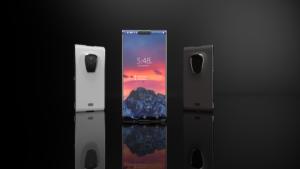Here come the first blockchain smartphones: What you need to know

Credit to Author: Lucas Mearian| Date: Fri, 13 Jul 2018 03:12:00 -0700
After months of speculation, Taiwanese electronics company Huawei Technologies Ltd. (HTC) has confirmed it will be releasing a blockchain-enabled smartphone this year that will allow users to securely store cryptocurrency offline and act as a compute node in a blockchain network.
“We want to double and triple the number of nodes of Ethereum and Bitcoin,” HTC said in its marketing material for the device. The new smartphone is expected to be able to work with multiple blockchain protocols allowing for interoperability between them.
In addition, the HTC Exodus blockchain-enabled smartphone will allow owners to play CryptoKitties, a decentralized app (Dapp) game. Dapps are applications that run across multiple nodes on peer-to-peer (P2P) networks.
It appears the world’s third-biggest handset maker may win a race to become the industry’s first to offer a blockchain smartphone; Swiss-based Sirin Labs announced its own $1,000 smartphone and $800 all-in-one PC with native blockchain capabilities last October; it scheduled the release for this September, according to reports.
Sirin Labs’ Finney blockchain smartphone.
HTC, however, plans to release its phone this quarter. HTC’s blockchain phone has already received “tens of thousands” of reservations globally, Phil Chen, the chief crypto officer at HTC, said in an interview during the RISE conference in Hong Kong this week.
Like HTC’s upcoming $1,000 Exodus blockchain smartphone, Sirin’s Finney smartphone will come with a built-in cold-storage crypto wallet for storing bitcoin, Ethereum and other digital tokens, and it will run on open-source, feeless blockchain.
Sirin was able to raise more than $100 million in an initial coin offering for the Android-based Finney smartphone and PC. Both will run Sirin’s open-source operating system, SIRIN OS.
Sirin Labs’ blockchain-enabled Finney PC and smartphone.
“Blockchain technology won’t cross over to the mainstream until the user experience is fixed. Our successful crowd-funding provides us the resources to solve such issues and bring to market a safer and simpler experience for mass market adoption,” Sirin CEO Moshe Hogeg said in a statement.
The Finney devices are designed to support inherent Blockchain applications such as a crypto wallet, secure exchange access, encrypted communications and a P2P resource sharing ecosystem for payment and apps, supported by Sirin’s own SRN token.
“This enables fast payments between the network peers without the need for mining (fee-less),” Sirin said in its marketing material.
Sirin Labs’ Finney smartphone and PC will, among other things, use the company’s own cryptocurrency, SRN, for payments and Dapps purchases.
Like Sirin’s Solarin Android smartphone, the Finney device will feature a physical toggle switch that will immediately turn off all unencrypted communications, ensuring the internal digital storage is wirelessly inaccessible, functioning as a “cold wallet” for digital currencies.
The Finney smartphone will use Qualcomm’s Snapdragon 845 processor, have a 6-in. 18:9 ratio display, 128GB of storage and an SD memory card slot capable of providing another 2TB of storage capacity.
HTC has yet to release details about its Exodus smartphone, but did say that one additional feature will be native encryption key recovery, a conundrum tied to the cryptocurrency community.
Blueprint designs for HTC’s upcoming Exodus smartphone, which will come with native blockchain capabilities.
While blockchain is a peer-to-peer secure networking technology over which data can be exchanged anonymously for a myriad of business or personal transactions, the encryption behind the electronic distributed ledger also means if you lose your private key, you lose your data – forever.
HTC didn’t offer any details about how it would enable key recovery on the smartphone, which will be manufactured by China-based FIH Mobile.
“I’ve looked at the Sirin project every now and then. From a security perspective, they’re likely to be on top of it because they’re designing the thing from the ground up,” said Martha Bennett, a principal analyst at Forrester Research. “But it’s a niche product if ever there was one.”
In terms of the on-board wallet, the key question is how both companies will keep sensitive cryptocurrency data secure, Bennett said.
“By definition, unless the phone is in flight mode, there’s always a connection, either via cell, Wi-Fi, NFC or Bluetooth (or any combination of the aforementioned). That offers a lot more attack surfaces than a USB stick that’s only occasionally connected,” Bennett said
Jack Gold, principal analyst for J.Gold Associates, said neither HTC’s nor Sirin’s blockchain-enabled smartphones will appeal to a mainstream audience as cryptocurrency activity is almost all trading, and remains in the purview of enthusiasts and speculators – “CryptoKitties notwithstanding.”
While still the third-largest handset maker, HTC in recent years has lost its market differentiation, something it’s hoping to regain with the launch of a blockchain smartphone, Gold said.
“It wants to reenter the smartphone battleground, but it can’t do so without a truly differentiated offering. Blockchain is one of those areas where there are few competitors right now. And this gives HTC some ‘halo effect’ for its devices,” Gold said. “But the question is, how many people truly want or need a blockchain enabled smartphone? What are they going to do with it in the short term. How many people need to store tokens on a phone and use them to pay for things?”
While HTC will allow mining on the phone, the processing power it is putting behind that function is minimal compared to mining rigs that use graphics cards and ASICs to handle thousands of operations per second.
“I suppose the ability to keep all of the crypto credential on the device rather than on a standalone piece of hardware could be attractive, but is that a reason people will buy?” Gold asked. “Finally, once the first device gets hacked, (and we’ve seen in the past that those things happen), how many people will be interested in buying a device?”